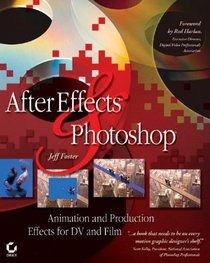Search -
After Effects and Photoshop: Animation and Production Effects for DV and Film
After Effects and Photoshop Animation and Production Effects for DV and Film
Author:
"... a book that needs to be on every motion graphic designer's shelf." — --Scott Kelby, President, National Association of Photoshop Professionals — Author Jeff Foster appeared on the DV Guys, a weekly radio show devoted to DV professionals and enthusiasts, for a LIVE online interview on Thursday, June 17, 2004. If you missed it, you can still li... more »
Author:
"... a book that needs to be on every motion graphic designer's shelf." — --Scott Kelby, President, National Association of Photoshop Professionals — Author Jeff Foster appeared on the DV Guys, a weekly radio show devoted to DV professionals and enthusiasts, for a LIVE online interview on Thursday, June 17, 2004. If you missed it, you can still li... more »
ISBN-13: 9780782143171
ISBN-10: 0782143172
Publication Date: 4/15/2004
Pages: 352
Rating: ?
ISBN-10: 0782143172
Publication Date: 4/15/2004
Pages: 352
Rating: ?
0 stars, based on 0 rating
Genres:
- Computers & Technology >> Web Development & Design >> Web Design >> Adobe Photoshop
- Computers & Technology >> Programming >> Graphics & Multimedia >> Animation
- Computers & Technology >> Graphics & Design >> Desktop Publishing >> General
- Computers & Technology >> Graphics & Design >> General
- Computers & Technology >> Graphics & Design >> Applications >> Adobe >> PhotoDeluxe & Photoshop
- Computers & Technology >> General




